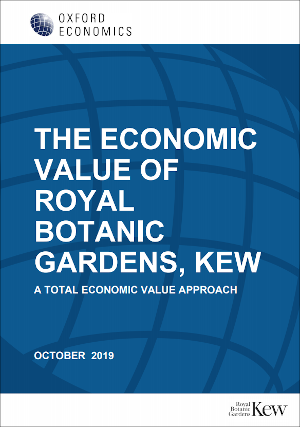Ungated Post | 24 Feb 2020
The Economic Value of Royal Botanic Gardens, Kew

Kew has two botanic gardens: the world-famous Kew Gardens in south-west London and Wakehurst, Kew’s wild botanic garden in Sussex. In 2018/19, Kew Gardens and Wakehurst together received a total of 2.4 million visits, including almost 100,000 from school children. But Kew is far more than simply a visitor attraction – it is a unique global resource for plant and fungal knowledge. The extensive collections, databases, scientific expertise, and global partnerships make Kew an unparalleled resource for students and researchers.
This study provides an update to our 2016 report on the total economic value of Kew. It details the economic benefits that accrue not only to visitors to Kew’s two botanic gardens, but to “indirect users” such as beneficiaries of its scientific output, and even “non-users” who may value Kew’s existence even though they do not actually visit. We use a range of economic techniques to estimate these values, reflecting the diversity of activities that Kew undertakes.
Our economic consulting team are world leaders in quantitative economic analysis, working with clients around the globe and across sectors to build models, forecast markets and evaluate interventions using state-of-the art techniques. Lead consultants on this project were:
Oxford Economics’ team is expert at applying advanced economic tools that provide valuable insights into today’s most pressing business, financial, and policy issues.
To find out more about our capabilities, contact:
EMEA
Sam Moore
+44 (0)207 803 1415
Email
Americas
Hamilton Galloway
+1 (646) 503 3068
Email
Asia
Christie Tang
+852 3974 8841
Email
Related Services

Post
The economic impact of abandoning the WTO
Oxford Economics have been commissioned by the International Chamber of Commerce (ICC) to provide an independent assessment of the economic impact of WTO dissolution. This report details our findings and the assumptions underpinning our analysis.
Find Out More
Post
The economic impact of the sports activities of public service media
This study shows how the sports activities of public service media supported €4.5 billion of GDP and 57,000 jobs across 31 European countries in 2022. The report also highlights wider economic benefits of public service media sports coverage, such as the way in which it leverages sponsorship income for sports bodies.
Find Out More
Post
Global Trade Education: The role of private philanthropy
Global trade can amplify economic development and poverty alleviation. Capable leaders are required to put in place enabling conditions for trade, but currently these skills are underprovided in developing countries. For philanthropists, investing in trade leadership talent through graduate-level scholarships is an opportunity to make meaningful contributions that can multiply and sustain global economic development.
Find Out More